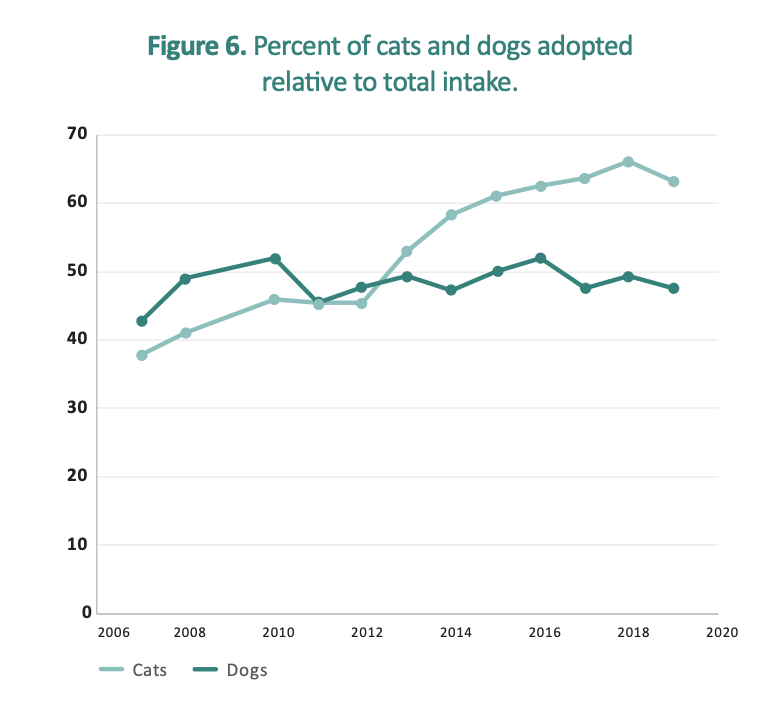

‘Pandemic Puppy’ trend feeding irresponsible breeders
COVID-19LifestyleNews Apr 13, 2021 Emma Harris

By Emma Harris
When lockdowns kept recurring and family game nights got boring, the rise of the ‘pandemic puppy’ took hold across Canada.
According to Humane Canada, 2020 saw a 20 to 60 per cent increase in demand for fostering and adoption of pets, with the pandemic driving the surge.
At one point, shelters throughout Canada had more demand than supply, leading people to search for their new furry friends in less ethical places.

Data showing history of dogs and cats being adopted in Canada from 2006-2018 Photo credit: Humane Canada
Humane Canada reports that 85 per cent of animal shelters were open by appointment only during the lockdowns that took place across the country. Many shelters were also unable to afford to care for the animals they did have in house because they could not host their usual fundraising events. Figures are not yet available for the final numbers of animals adopted in the year 2020 in Canada.
With animal shelters struggling, many families looking to buy or adopt a pet searched through lists of breeders online or on websites like Kijiji and Facebook Marketplace for available dogs or cats. And while there are many responsible breeders across the country, there are also puppy mills and backyard breeders.
A puppy mill, as defined by the National Companion Animal Coalition (NCAC) with help from Humane Canada, is “a high-volume, sub-standard dog breeding operation, which sells purebred or mixed-breed dogs, directly or indirectly, to unsuspecting buyers.” In Canada, there are no laws against puppy mills or the importation of domestic animals, but there are circumstances where puppy mills have been found in violation of animal cruelty laws due to the suffering and distress on the animals.
Humane Canada states that a backyard breeder is someone who “either intentionally breeds one of a few dogs but have very little knowledge, or who have an accidental litter because they hadn’t got around to spaying their female dog yet.” While this seems harmless, often when these pet owners see how much a family is willing to pay for a purebred or mixed-breed puppy they want to make a business out of it, because to them it’s an easy income.
This ‘easy income’ was exacerbated during the pandemic when people’s usual income may have decreased or come to a halt. As online shopping increased, it became easier for people to sell dogs online without the buyers seeing the conditions in which these animals were coming from. While in Canada, most breeders of purebreds are registered members of a “club” like the Canadian Kennel Club (CKC), it does not guarantee that the dogs are treated properly or that any medical screening is done. The CKC does not monitor or inspect the breeding facilities of the members who register their puppies.
Ontario residents Anita Pal bought her dog, a barbet named Phoebe, from a kennel in 2019. The kennel, a CKC-registered company, sells both Portuguese Waterdogs and Barbets, also known as French Waterdogs. The owner states on the website that all of the puppies go through the “Volhart puppy temperament tests to be sure that each puppy and family is matched perfectly.” However, in 2019, after extensive research, when Pal decided on that particular kennel, she took her young child with her to see the litter of barbets. On arriving, her child held a particular puppy and the owner told him he could get whichever one he wanted, regardless of the ‘match test’ and her agreement with Pal herself. After returning two times to see their puppy, the kennel tried to sell them another dog when they went to pick her up at the eight-week mark. They were told that their original choice had behaviour issues. But Pal and her family insisted on the original puppy, who they named Phoebe, as they had become acquainted with her.
Pal said the puppy had a “funky smell,” but she didn’t think much of it. About two weeks later, they noticed a white, dusty coat of dander covering her head to toe. Her skin was dry, she was itchy and weighed only 19 pounds at her one-year mark. The breed that is supposed to weigh 35 to 40 pounds. She would chew her fur off, scratched uncontrollably all while Pal and her family spent a lot of money on vet visits.
Pal said that she came across a blog about the kennel and discovered something suspicious. The business name of the kennel had been changed twice.
“Somebody who’s got a good reputation does not change their business name,” said Pal.
The blog contains hundreds of messages dating back to 2012 that target the kennel and claim the owner to be an irresponsible dog breeder. Many of the owners of Barbets posted their issues with their dogs from seizures to allergies like those that Phoebe has, which are not common to the breed itself.
Ashleigh Scott, another Barbet owner who got her dog Henson from the same kennel has experienced a similar situation. Henson started with the $100-injection which worked for a few doses but then he became immune. After three times, Scott and her family put him on an expensive pill called ‘apoquil.’
The kennel initially told Pal that there were no issues with other dogs that have come from them, but those from the blog have told her otherwise. This experience has turned Pal off entirely from buying purebred dogs. She hopes her experience will serve as a point of caution for people looking at adopting their own pets, especially during the pandemic.

